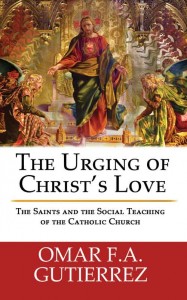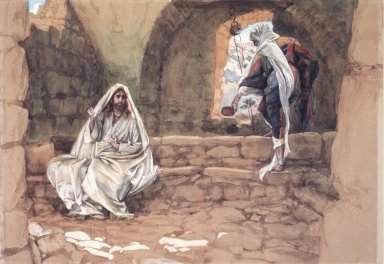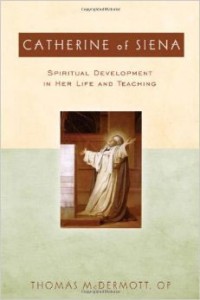“God, be merciful to me a sinner!“
[powerpress]
an excerpt from today’s reflection by Don Schwager:
How can we know if our prayer is pleasing to God or not? The prophet Hosea, who spoke in God’s name, said: “I desire steadfast love and not sacrifice” (Hosea 6:6). The prayers and sacrifices we make to God mean nothing to him if they do not spring from a heart of love for God and for one’s neighbor. How can we expect God to hear our prayers if we do not approach him with humility and with a contrite heart that seeks mercy and forgiveness? We stand in constant need of God’s grace and help. That is why Scripture tells us that “God opposes the proud, but gives grace to the humble” (James 4:6; Proverbs 3:34).
Jesus reinforced this warning with a vivid story of two people at prayer. Why did the Lord accept one person’s prayer and reject the  other’s prayer? Luke gives us a hint: despising one’s neighbor closes the door to God’s heart. Expressing disdain and contempt for others is more than being mean-minded. It springs from the assumption that one is qualified to sit in the seat of judgment and to publicly shame those who do not conform to our standards and religious practices. Jesus’ story caused offense to the religious-minded Pharisees who regarded “tax collectors” as unworthy of God’s grace and favor. How could Jesus put down a “religious person” and raise up a “public sinner”?
other’s prayer? Luke gives us a hint: despising one’s neighbor closes the door to God’s heart. Expressing disdain and contempt for others is more than being mean-minded. It springs from the assumption that one is qualified to sit in the seat of judgment and to publicly shame those who do not conform to our standards and religious practices. Jesus’ story caused offense to the religious-minded Pharisees who regarded “tax collectors” as unworthy of God’s grace and favor. How could Jesus put down a “religious person” and raise up a “public sinner”?
Jesus’ parable speaks about the nature of prayer and our relationship with God. It does this by contrasting two very different attitudes towards prayer. The Pharisee, who represented those who take pride in their religious practices, exalted himself at the expense of others. Absorbed with his own sense of self-satisfaction and self-congratulation, his boastful prayer was centered on his good religious practices rather than on God’s goodness, grace, and pardon. Rather than humbling himself before God and asking for God’s mercy and help, this man praised himself while despising those he thought less worthy. The Pharisee tried to justify himself before God and before those he despised; but only God can justify us. The tax collector, who represented those despised by religious-minded people, humbled himself before God and begged for mercy. His prayer was heard by God because he had true sorrow for his sins. He sought God with humility rather than with pride.
This parable presents both an opportunity and a warning. Pride leads to self-deception and spiritual blindness. True humility helps us to see ourselves as we really are in God’s eyes and it inclines us to seek God’s help and mercy. God dwells with the humble of heart who recognize their own sinfulness and who acknowledge God’s mercy and saving grace. I dwell in the high and holy place, and also with him who is of a contrite and humble spirit (Isaiah 57:15). God cannot hear us if we boast in ourselves and despise others. Do you humbly seek God’s mercy and do you show mercy to others, especially those you find difficult to love and to forgive?
“Lord Jesus, may your love and truth transform my life – my inner thoughts, intentions, and attitudes, and my outward behavior, speech, and actions. Where I lack charity, kindness, and foreberance, help me to embrace your merciful love and to seek the good of my neighbor, even those who cause me ill-favor or offense. May I always love as you have loved and forgive others as you have forgiven.”
for the full reflection visit : Daily Reading and Meditation
Tags: God's mercy, Lord Jesus, religious practices
This entry was posted on Saturday, March 29th, 2014 at 9:16 am
You can follow any responses to this entry through the RSS 2.0 feed.
Episode 2 The Daily Prayer of Discernment: The Ignatian Wisdom of the Examen Prayer with Fr. Timothy Gallagher. 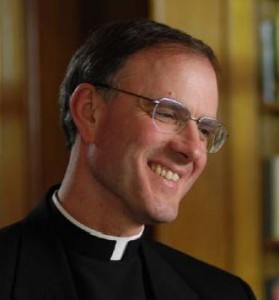
 The First Step in the Examen Prayer:  Gratitude.  Taking time out of the day when our hearts are free to receive the Lord’s presence.  Prayer always takes two persons in relationship…ourselves and God.  Then together with the Lord, we see what the gifts of love God has poured out upon us.  The key in this first step, is not to look for our missteps (that may come later), but to look for the gifts and give thanks.
[powerpress]
As outlined from the Spiritual Exercises of St. Ignatius of Loyola
(translated from the autograph by Fr. E. Mullan, S.J. Â 1909Â in the public domain)
METHOD FOR MAKING THE GENERAL EXAMEN
It contains in it five Points.First Point. The first Point is to give thanks to God our Lord for the benefits received.
Second Point. The second, to ask grace to know our sins and cast them out.
Third Point. The third, to ask account of our soul from the hour that we rose up to the present Examen, hour by hour, or period by period: and first as to thoughts, and then as to words, and then as to acts, in the same order as was mentioned in the Particular Examen.
Fourth Point. The fourth, to ask pardon of God our Lord for the faults.
Fifth Point. The fifth, to purpose amendment with His grace.OUR FATHER.
Father Timothy M. Gallagher, O.M.V., was ordained in 1979 as a member of the Oblates of the Virgin Mary, a religious community dedicated to retreats and spiritual formation according to the Spiritual Exercises of St. Ignatius. Â Fr. Gallagher is featured on the EWTN series “Living the Discerning Life: Â The Spiritual Teachings of St. Ignatius of Loyola”. Â For more information on books and audio available for purchase from Fr. Timothy Gallagher check out his website: www.frtimothygallagher.org
For the other episodes in this series check out
Fr. Timothy Gallagher’s “Discerning Hearts†page
Tags: Daily Prayer, Timothy Gallagher
This entry was posted on Friday, March 28th, 2014 at 4:24 pm
You can follow any responses to this entry through the RSS 2.0 feed.
“Love the Lord with all your heart, soul, mind, and strength”
[powerpress]
an excerpt from today’s reflection by Don Schwager: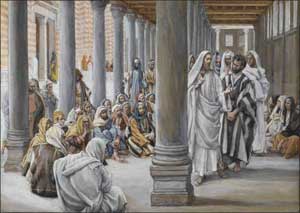
How does love and obedience to God’s law go together? The Pharisees prided themselves in the knowledge of the law and their ritual requirements. They made it a life-time practice to study the six hundred and thirteen precepts of the Old Testament along with the numerous rabbinic commentaries. They tested Jesus to see if he correctly understood the law as they did. Jesus startled them with his profound simplicity and mastery of the law of God and its purpose. What does God require of us? Simply that we love as he loves! God is love and everything he does flows from his love for us. God loved us first and our love for him is a response to his exceeding grace and kindness towards us. The love of God comes first and the love of neighbor is firmly grounded in the love of God. The more we know of God’s love and truth the more we love what he loves and reject what is hateful and contrary to his will.
What makes our love for God and his commands grow in us? Faith in God and hope in his promises strengthen us in the love of God. They are essential for a good relationship with God, for being united with him. The more we know of God the more we love him and the more we love him the greater we believe and hope in his promises. The Lord, through the gift of the Holy Spirit, gives us a new freedom to love as he loves (Galatians 5:13). Do you allow anything to keep you from the love of God and the joy of serving others with a generous heart? Paul the Apostle says: hope does not disappoint us, because God’s love has been poured into our hearts through the Holy Spirit which has been given to us (Romans 5:5). Do you know the love which conquers all?
“We love you, O our God; and we desire to love you more and more. Grant to us that we may love you as much as we desire, and as much as we ought. O dearest friend, who has so loved and saved us, the thought of whom is so sweet and always growing sweeter, come with Christ and dwell in our hearts; that you keep a watch over our lips, our steps, our deeds, and we shall not need to be anxious either for our souls or our bodies. Give us love, sweetest of all gifts, which knows no enemy. Give us in our hearts pure love, born of your love to us, that we may love others as you love us. O most loving Father of Jesus Christ, from whom flows all love, let our hearts, frozen in sin, cold to you and cold to others, be warmed by this divine fire. So help and bless us in your Son.” (Prayer of Anselm, 12th century)
for the full reflection visit : Daily Reading and Meditation
Tags: catholic, catholic podcast, catholic prayer, Faith in God, relationship with God
This entry was posted on Friday, March 28th, 2014 at 5:09 am
You can follow any responses to this entry through the RSS 2.0 feed.
“If it is by the finger of God”
[powerpress]
an excerpt from today’s reflection by Don Schwager: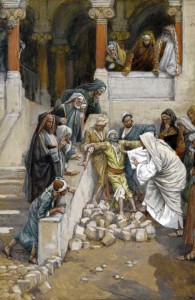
Jesus’ numerous exorcisms brought freedom to many who were troubled and oppressed by the work of evil spirits. Jesus himself encountered personal opposition and battled with Satan when he was put to the test in the wilderness just before his public ministry. He overcame the evil one through his obedience to the will of his Father. Some of the Jewish leaders reacted vehemently to Jesus’ healings and exorcisms and they opposed him with malicious slander. How could he get the power and authority to release individuals from Satan’s power? They assumed that he had to be in league with Satan. They attributed his power to Satan rather than to God.
Jesus answers their charge with two arguments. There were many exorcists in Palestine in Jesus’ time. So Jesus retorted by saying that they also incriminate their own kin who cast out demons. If they condemn Jesus they also condemn themselves. In his second argument he asserts that no kingdom divided against itself cannot survive for long? We have witnessed enough civil wars in our own time to prove the destructive force at work here for the annihilation of whole peoples and their land. If Satan lends his power against his own forces then he is finished. How can a strong person be defeated except by someone who is stronger? Jesus asserted his power and authority to cast out demons as a clear demonstration of the reign of God. Jesus’ reference to the finger of God points back to Moses’ confrontation with Pharoah and his magicians who represented Satan and the kingdom of darkness (see Exodus 8:19). Jesus claims to be carrying on the tradition of Moses whose miracles freed the Israelites from bondage by the finger of God. God’s power is clearly at work in the exorcisms which Jesus performed and they give evidence that God’s kingdom has come.
Jesus makes it clear that there are no neutral parties. We are either for Jesus or against him, for the kingdom of God or against it. There are two kingdoms in opposition to one another – the kingdom of God and the kingdom of darkness under the rule of Satan. If we disobey God’s word, we open to door to the power of sin and Satan in our lives. If you want to live in freedom from sin and Satan, then your house – your life and all you possess – must be occupied by Jesus where he is enthroned as Lord and Savior. Is the Lord Jesus the Master of your home, heart, mind, and will?
“O Lord, our God, grant us, we beseech you, patience in troubles, humility in comforts, constancy in temptations, and victory over all our spiritual foes. Grant us sorrow for our sins, thankfulness for your benefits, fear of your judgment, love of your mercies, and mindfulness of your presence; now and for ever.” (Prayer by John Cosin)
for the full reflection visit : Daily Reading and Meditation
Tags: catholic, catholic podcast, catholic prayer
This entry was posted on Thursday, March 27th, 2014 at 12:03 am
You can follow any responses to this entry through the RSS 2.0 feed.
Episode 22 – The Holy Rule of St. Benedict: A Spiritual Path for Today’s World with Fr. Mauritius Wilde O.S.B., PhD.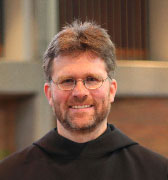
On Suffering
[powerpress]
From the Holy Rule of St. Benedict:
CHAPTER 7
an excerpt:
The fourth degree of humility is, that, if hard and distasteful things are commanded, nay, even though injuries are inflicted, he accept them with patience and even temper, and not grow weary or give up, but hold out, as the Scripture saith: “He that shall persevere unto the end shall be saved” (Mt 10:22). And again: “Let thy heart take courage, and wait thou for the Lord” (Ps 26[27]:14). And showing that a faithful man ought even to bear every disagreeable thing for the Lord, it saith in the person of the suffering: “For Thy sake we suffer death all the day long; we are counted as sheep for the slaughter” (Rom 8:36; Ps 43[44]:22). And secure in the hope of the divine reward, they go on joyfully, saying: “But in all these things we overcome because of Him that hath loved us” (Rom 8:37). And likewise in another place the Scripture saith: “Thou, O God, hast proved us; Thou hast tried us by fire as silver is tried; Thou hast brought us into a net, Thou hast laid afflictions on our back” (Ps 65[66]:10-11). And to show us that we ought to be under a Superior, it continueth, saying: “Thou hast set men over our heads” (Ps 65[66]:12). And fulfilling the command of the Lord by patience also in adversities and injuries, when struck on the one cheek they turn also the other; the despoiler of their coat they give their cloak also; and when forced to go one mile they go two (cf Mt 5:39-41); with the Apostle Paul they bear with false brethren and “bless those who curse them” (2 Cor 11:26; 1 Cor 4:12).
Father Mauritius Wilde, OSB, Ph.D., did his philosophical, theological and doctoral studies in Europe. He is the author of several books and directs retreats regularly. He serves as Prior of our monastery in Schuyler.
 For more information about the ministry of the the Missionary Benedictines of Christ the King Priory in Schuyler, Nebraska visit here:
For more information about the ministry of the the Missionary Benedictines of Christ the King Priory in Schuyler, Nebraska visit here:
Tags: Holy Rule of St. Benedict
This entry was posted on Wednesday, March 26th, 2014 at 12:11 am
You can follow any responses to this entry through the RSS 2.0 feed.
Episode 37- Regnum Novum: Bringing forth the New Evangelization through Catholic Social Teaching with Omar Gutierrez –  We continue the study of the “Compendium of the Social Doctrine of the Church” Â Chapter 10 “Safeguarding the Environment”
We continue the study of the “Compendium of the Social Doctrine of the Church” Â Chapter 10 “Safeguarding the Environment”
[powerpress]
CHAPTER TEN
SAFEGUARDING THE ENVIRONMENT
I. BIBLICAL ASPECTS
II. MAN AND THE UNIVERSE OF CREATED THINGS
III. THE CRISIS IN THE RELATIONSHIP BETWEEN MAN AND THE ENVIRONMENT
IV. A COMMON RESPONSIBILITY
a. The environment, a collective good
b. The use of biotechnology
c. The environment and the sharing of goodsÂ
d. New lifestyles
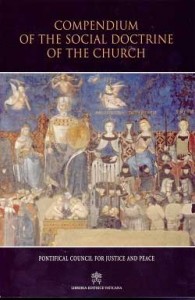
We live at a very special time. The confluence of many things has brought forth the clear need to be able to articulate the Social Teaching of the Catholic Church in a way that is accessible and applicable. This is not to be an effort where high-minded theories are to be bandied about. Rather, this is a time of opportunity wherein we can apply the Social Doctrine to the concrete so as to bring about a New Kingdom, a Revolution. – Omar G.
Also visit Omar’s “Discerning Hearts” page Catholic Social Teaching 101
You can find Omar Gutierrez’s book here
In The Urging of Christ’s Love Omar Gutiérrez tells the stories of eleven people who lived their lives in pursuit of Christ Jesus. Each Saint, Blessed or Servant of God is considered in the context of Catholic Social Teaching. Then at the end of each chapter a prayer is offered and quotes from the Compendium of the Social Doctrine of the Church are provided in order to link the lessons we can learn from the saint’s life to Church teaching. By discovering some new saint friends, and rediscovering some old ones, The Urging of Christ’s Love presents Catholic Social Teaching in an accessible and important way.
Tags: catholic, catholic podcast, catholic prayer
This entry was posted on Wednesday, March 26th, 2014 at 12:10 am
You can follow any responses to this entry through the RSS 2.0 feed.
 Devin Schadt  offers  a tremendous work proclaiming St. Joseph as a model for the authentic expression of manhood and fatherhood.  In “ Joseph’s Way: The Call to Fatherly Greatness: Part I: Prayer of Faith”, he shares his compelling personal witness to the great saint’s role in his life.  He also uses  Scripture, the Catechism of the Catholic Church, and many other outstanding resources, to fashion a study that helps to deepen the faith of those who walk with good St. Joseph through the perils men, as well as their families, face in our world today.
Devin Schadt  offers  a tremendous work proclaiming St. Joseph as a model for the authentic expression of manhood and fatherhood.  In “ Joseph’s Way: The Call to Fatherly Greatness: Part I: Prayer of Faith”, he shares his compelling personal witness to the great saint’s role in his life.  He also uses  Scripture, the Catechism of the Catholic Church, and many other outstanding resources, to fashion a study that helps to deepen the faith of those who walk with good St. Joseph through the perils men, as well as their families, face in our world today.
[powerpress]
You can find the book here
From the book description:
Among the most serious crises facing our nation and the world is the crisis of fatherhood. Indeed, if the world is to be converted, the Church must be renewed. If the macro-Church is to be renewed, the micro church of the family must be restored. And if the family is to be restored and re-vitalized, the man who is both husband and father must become who God has created him to be – a father on earth like the Father in heaven. Joseph’s Way: The Call to Fatherly Greatness, Part I: Prayer of Faith is the first in a four book series that comprises an in-depth vision of the human father as seen through the lens of St. Joseph and the patriarchs. By comparing Abraham the ‘Father in Faith’, with St. Joseph the just father who lived by faith fathers will discover the power of their vocation and their essential role in rebuilding society. Joseph’s Way: The Call to Fatherly Greatness, Part I: Prayer of Faith helps men become great fathers by re-discovering the hidden greatness of fatherhood.
Tags: catholic, catholic podcast, catholic prayer
This entry was posted on Wednesday, March 26th, 2014 at 12:09 am
You can follow any responses to this entry through the RSS 2.0 feed.
“Whoever relaxes one of the commandments “
[powerpress]
an excerpt from today’s reflection by Don Schwager: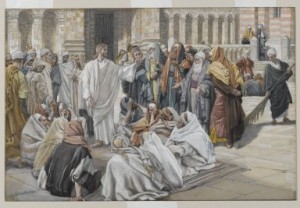
Jesus taught reverence for God’s law – reverence for God himself, for the Lord’s Day, reverence or respect for parents, respect for life, for property, for another person’s good name, respect for oneself and for one’s neighbor lest wrong or hurtful desires master us. Reverence and respect for God’s commandments teach us the way of love – love of God and love of neighbor. What is impossible to men and women is possible to God and those who put their faith and trust in God. Through the gift of the Holy Spirit the Lord transforms us and makes us like himself. We are a new creation in Christ (2 Corinthians 5:17) because “God’s love has been poured into our hearts through the Holy Spirit which has been given to us” (Romans 5:5). God gives us the grace to love as he loves, to forgive as he forgives, to think as he thinks, and to act as he acts. The Lord loves justice and goodness and he hates every form of wickedness and sin. He wants to set us free from our unruly desires and sinful habits, so that we can choose to live each day in the peace, joy, and righteousness of his Holy Spirit (Romans 14: 17). To renounce sin is to turn away from what is harmful and destructive for our minds and hearts, and our very lives. As his followers we must love and respect his commandments and hate every form of sin. Do you love and revere the commands of the Lord?
“Lord Jesus, grant this day, to direct and sanctify, to rule and govern our hearts and bodies, so that all our thoughts, words and deeds may be according to your Father’s law and thus may we be saved and protected through your mighty help.”
for the full reflection visit : Daily Reading and Meditation
Tags: catholic, catholic podcast, catholic prayer
This entry was posted on Wednesday, March 26th, 2014 at 12:03 am
You can follow any responses to this entry through the RSS 2.0 feed.
Episode 1 The Daily Prayer of Discernment: The Ignatian Wisdom of the Examen Prayer with Fr. Timothy Gallagher –Â
Serves as an introduction to the coming series and the Examen Prayer. 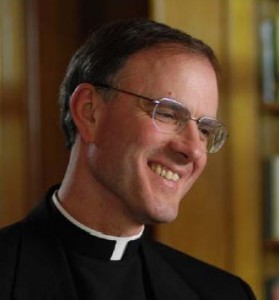 Â
Â
Can we live with our spiritual eyes open to catch the action of God? Â The Examen Prayer is the one prayer St. Ignatius could not imagine doing without. Â You can’t stand still in the spiritual life if you are praying the Examen Prayer. Â Â
[powerpress]
As outlined from the Spiritual Exercises of St. Ignatius of Loyola
(translated from the autograph by Fr. E. Mullan, S.J. Â 1909Â in the public domain)
METHOD FOR MAKING THE GENERAL EXAMEN
It contains in it five Points.First Point. The first Point is to give thanks to God our Lord for the benefits received.
Second Point. The second, to ask grace to know our sins and cast them out.
Third Point. The third, to ask account of our soul from the hour that we rose up to the present Examen, hour by hour, or period by period: and first as to thoughts, and then as to words, and then as to acts, in the same order as was mentioned in the Particular Examen.
Fourth Point. The fourth, to ask pardon of God our Lord for the faults.
Fifth Point. The fifth, to purpose amendment with His grace.OUR FATHER.
Father Timothy M. Gallagher, O.M.V., was ordained in 1979 as a member of the Oblates of the Virgin Mary, a religious community dedicated to retreats and spiritual formation according to the Spiritual Exercises of St. Ignatius. Â Fr. Gallagher is featured on the EWTN series “Living the Discerning Life: Â The Spiritual Teachings of St. Ignatius of Loyola”. Â For more information on books and audio available for purchase from Fr. Timothy Gallagher check out his website: www.frtimothygallagher.org
For the other episodes in this series check out
Fr. Timothy Gallagher’s “Discerning Hearts†page
Tags: Daily Prayer, Timothy Gallagher
This entry was posted on Tuesday, March 25th, 2014 at 2:44 pm
You can follow any responses to this entry through the RSS 2.0 feed.
“You have found favor with God“
[powerpress]
an excerpt from today’s reflection by Don Schwager: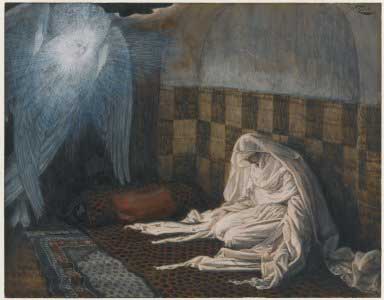
How does Mary respond to the word of God delivered by the angel Gabriel? She knows she is hearing something beyond human capability. It will surely take a miracle which surpasses all that God has done previously. Her question, “how shall this be, since I have no husband” is not prompted by doubt or skepticism, but by wonderment! She is a true hearer of the Word and she immediately responds with faith and trust. Mary’s prompt response of “yes” to the divine message is a model of faith for all believers.
Mary believed God’s promises even when they seemed impossible. She was full of grace because she trusted that what God said was true and would be fulfilled. She was willing and eager to do God’s will, even if it seemed difficult or costly. Mary is the “mother of God” because God becomes incarnate when he takes on flesh in her womb. When we pray the ancient creed (Nicene Creed) we state our confession of faith in this great mystery: “For us men and for our salvation he came down from heaven; by the power of the Holy Spirit, he became incarnate of the Virgin Mary, and was made man.”
“Heavenly Father, you offer us abundant grace, mercy, and forgiveness through your Son, Our Lord Jesus Christ. Help me to live a grace-filled life as Mary did by believing in your promises and by giving you my unqualified ‘yes’ to your will and plan for my life.”
for the full reflection visit : Daily Reading and Meditation
Tags: catholic, catholic podcast, catholic prayer
This entry was posted on Tuesday, March 25th, 2014 at 8:27 am
You can follow any responses to this entry through the RSS 2.0 feed.
“Jesus’ word of judgment“
[powerpress]
an excerpt from today’s reflection by Don Schwager: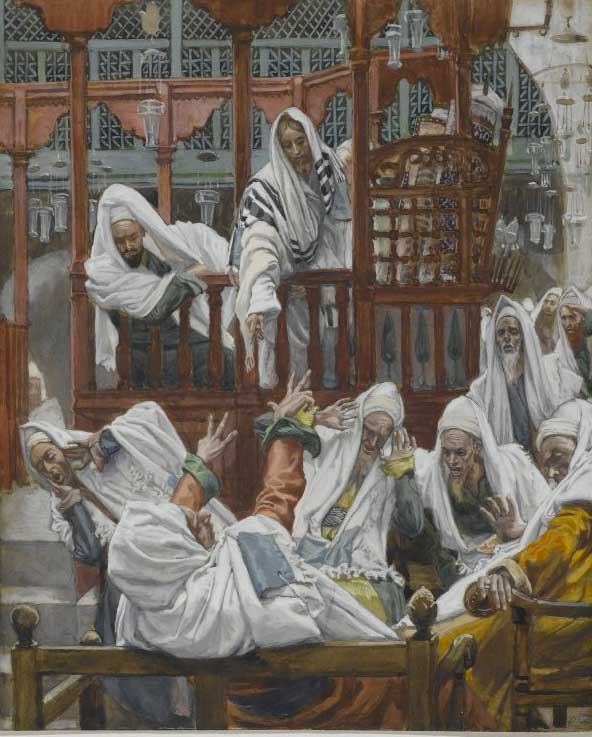
When Jesus proclaimed the good news of God’s kingdom to his own people, he did not hesitate to confront them with their sin of indifference and unbelief. He startled his listeners in the synagogue at Nazareth with a seeming rebuke that no prophet or servant of God can receive honor among his own people. He then angered them when he complimented the Gentiles who seemed to have shown more faith in God than the “chosen ones” of Israel. The Jews regarded the unbelieving Gentiles as “fuel for the fires of hell.” Jesus’ praise for “outsiders” offended the hears of his own people because they were blind-sighted to God’s mercy and plan of redemption for all nations. The word of warning and judgment spoken by Jesus was met with hostility by his own people. They forcibly threw him out of the town and would have done him harm had he not stopped them.
The Lord Jesus offers healing and pardon to all who humbly ask for his mercy and help. He will set us free from every sinful habit and every harmful way of relating to our neighbor, if we allow him to cleanse and heal us. If we want to walk in freedom and grow in love and holiness, then we must humbly renounce our sinful ways and submit to Christ’s instruction and healing for our lives. Scripture tells us that the Lord disciplines us for our good that we may share his holiness (Hebrews 12:10). Do you want the Lord Jesus to set you free from every sinful pattern and to make you whole and well again? Ask him to show you the way to walk in his love and truth.
“Lord Jesus, teach me to love your ways that I may be quick to renounce sin and wilfulness in my life. Make me whole and clean again that I may I delight to do your will.”
for the full reflection visit : Daily Reading and Meditation
Tags: catholic, catholic podcast, catholic prayer
This entry was posted on Monday, March 24th, 2014 at 12:03 am
You can follow any responses to this entry through the RSS 2.0 feed.
Episode 4 – The Cross of Christ teaches us… – Third Week
In “The Power of the Cross”, Michael Dubruiel penned a truly exceptional meditation on the Cross of Christ which  serves beautifully as a source for reflection any time of the year, but it is particularly poignant and compelling during the weeks of Lent. Several years ago Bruce and I had the chance to have a series of conversations with Michael during Lent using his book for reflection…it was a big hit with the audience. Those discussions have been remastered and made available once again here. Michael died unexpectedly in February of 2009, but his gifts continue to be shared through his books and many other venues, and hopefully through this humble portal. The sentiments and teachings Michael offers is truly timeless.
serves beautifully as a source for reflection any time of the year, but it is particularly poignant and compelling during the weeks of Lent. Several years ago Bruce and I had the chance to have a series of conversations with Michael during Lent using his book for reflection…it was a big hit with the audience. Those discussions have been remastered and made available once again here. Michael died unexpectedly in February of 2009, but his gifts continue to be shared through his books and many other venues, and hopefully through this humble portal. The sentiments and teachings Michael offers is truly timeless.
[powerpress]
Episode 4 – The Cross of Christ unites… – Michael discusses:
Day 15 – How We Worship
Day 16 – How We See Jesus
Day 17 – How We Forgive
Day 18 – Law and Love
Day 19 – Our Lives
Day 20 – Our Priorities
Day 21 – How We See Ourselves
Michael’s wife, author Amy Welborn, has made “The Power of the Cross” available as a free e-book available over the internet ! Â I HIGHLY encourage you to download this exceptional work…there also plans to make it once again available as a paperback book.
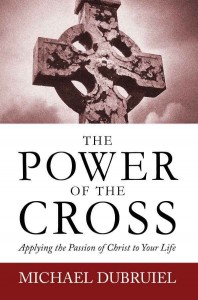 The Power of the Cross is now available as a free e-book,
The Power of the Cross is now available as a free e-book,
check out more information by going here
Check out more at the Discerning Hearts’ Michael Dubruiel page
Tags: michael dubruiel, The Power of the Cross
This entry was posted on Sunday, March 23rd, 2014 at 7:23 am
You can follow any responses to this entry through the RSS 2.0 feed.
“Whoever drinks of the water that I shall give will never thirstâ€
an excerpt from today’s reflection by Don Schwager:
Would you give water to somebody who snubbed you or treated you like an enemy? Jesus did just that and more! He treated Samaritans, the sworn enemies of the Jews, with great kindness and respect. The Jews and the Samaritans who lived in Israel between Galilee and Judaea, had been divided for centuries. They had no dealings with one another, avoiding all social contact, even trade, and inter-marriage. If their paths crossed it would not be unusual for hostility to break out. When Jesus decided to pass through Samaria he stopped at Jacob’s well because it was mid-day and he was both exhausted and thirsty. Jacob’s well was a good mile and a half from the nearest town, called Sychar. It wasn’t easy to draw water from this well since it was over a hundred feet deep. Jesus had neither rope nor bucket to fetch the water. When a Samaritan woman showed up at the well, both were caught by surprise. Why would a Samaritan woman walk a mile and a half in the mid-day heat to fetch her water at a remote well rather than in the local town? She was an outcast and not welcomed among her townspeople. Jesus then did something no respectable Jew would think of doing. He reached out to a Samaritan, thus risking ritual impurity and scorn from his fellow Jews. He also did something no strict Rabbi would dare to do in public without loss to his reputation. He greeted the woman and spoke openly with her. Not only was she a woman, but an adulteress and public sinner as well. No decent Jew or Samaritan would even think of being seen with such a woman, let alone exchanging a word with her!
Jesus broke through the barriers of prejudice, hostility, and tradition to bring the good news of peace and reconciliation to Jews, Samaritans, and Gentiles alike. He demonstrated the universality of the gospel both in word and deed. No one is barred from the love of God and the good news of salvation. There is only one thing that can keep us from God and his redeeming love – our stubborn pride and wilful rebellion.
What is the point of Jesus’ exchange with the Samaritan woman about water? Water in the arid land was scarce. Jacob’s well was located in a strategic fork of the road between Samaria and Galilee. One can live without food for several days, but not without water. Water is a source of life and growth for all living things. When rain came to the desert, the water transformed the wasteland into a fertile field. The kind of water which Jesus spoke about was living, running, fresh, pure water. Fresh water from a cool running stream was always preferred to the still water one might find in a pool or resevoir. When the Israelites complained about lack of water in the wilderness, God instructed Moses to strike the rock and a stream of fresh living water gushed out (Exodus17:6 ). Even though the Israelites did not trust God to care for them in the wilderness, God, nonetheless gave them abundant water and provision through the intercession of his servant Moses.
The image of “living water” is used throughout the scriptures as a symbol of God’s wisdom, a wisdom that imparts life and blessing to all who receive it. “The teaching of the wise is a fountain of life†(Proverbs 13:14). “Living water” was also a symbol for the Jews of thirst of the soul for God. The water which Jesus spoke of symbolized the Holy Spirit and his work of recreating us in God’s image and sustaining in us the new life which comes from God. The life which the Holy Spirit produces in us makes us a “new creation” in Jesus Christ (2 Corinthians 5:17). Do you thirst for God and for the life of the Holy Spirit within you?
“Lord Jesus, my soul thirsts for you. Fill me with your Holy Spirit that I may always find joy in your presence and take delight in doing your will.â€
for the full reflection visit : Daily Reading and Meditation
Tags: Jesus, Samaritan, Samaritans
This entry was posted on Sunday, March 23rd, 2014 at 12:01 am
You can follow any responses to this entry through the RSS 2.0 feed.
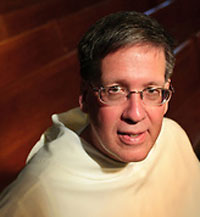 Episode 5 St. Catherine of Siena: Her Life and Teachings with Fr. Thomas McDermott
Episode 5 St. Catherine of Siena: Her Life and Teachings with Fr. Thomas McDermott
[powerpress]
 In this episode, Fr. McDermott  begins a more generalized discussion on the teachings of St. Catherine of Siena.
In this episode, Fr. McDermott  begins a more generalized discussion on the teachings of St. Catherine of Siena.
Fr. McDermott speaks of “The Dialogue” and how it came to be.  Some of the basic teachings of St. Catherine are presented such as “The Truth of God the Father”.  He relates the motto of the  Dominican order, “Veritas” (Truth), was foundational for St. Catherine.  The Supreme Truth about God and the truth of the human person.  Fr. McDermott also touches on St. Catherine’s teachings on sin, selfish self-love in particular.  How do we arrive at “truth”?  Prayer is key, along with the Scriptures and the Sacraments.  Also St. Catherine’s teachings on discernment, humility, love, patience and obedience, as well as, the doctrine of deification, is addressed.
Fr. Thomas McDermott, OP is Regent of Studies for the Dominican Province of St. Albert the Great and is the author of “Catherine of Siena: Spiritual Development in Her Life and Teaching” (Paulist, 2008) and “Filled with all the Fullness of God: An Introduction to Catholic Spirituality”. He obtained a doctorate in spiritual theology from the Angelicum and taught for several years at Kenrick-Glennon Seminary in St. Louis. He crrently serves as pastor at St. Vincent Ferrer, in Chicago, IL.
Tags: McDermott, st catherine of siena, Thomas McDermott
This entry was posted on Friday, March 21st, 2014 at 2:37 pm
You can follow any responses to this entry through the RSS 2.0 feed.
 Episode 13- Seeking Truth with Sharon Doran -Announcement of the Kingdom Of God (PART 1) [powerpress]
Episode 13- Seeking Truth with Sharon Doran -Announcement of the Kingdom Of God (PART 1) [powerpress]
Episode 13 –
Call of the Apostles (part 1)
“Go away from me Lord, for I am a sinful man.â€
These are the words of Peter when he realizes he is in the presence of the Lord. But as Sharon teaches us tonight, Jesus is not afraid of sin and he stays, calling Peter on to become the Rock upon which he will build his Church. In what can only be described as a moving and anointed lecture, Sharon describes the call of the Apostles and the creation of the Apostolic succession that extends to our modern times. Jesus commanded these fishers of men to “Cast out into the deep and let down your nets for a catch.†This too is our call: to grow ever deeper in relationship with our Lord.
Sharon Doran serves as the teaching director of “Seeking Truth.†An experienced Bible Study teacher, Sharon has a passion for scripture that will motivate and challenge you to immerse yourself in God’s Word and apply His message to your every day life.
 “Seeking Truth†is an in depth Catholic Bible Study, commissioned by the Archdiocese of Omaha in response to John Paul II’s call to the New Evangelization as well as Pope Benedict XVI’s exhortation for all Catholics to study scripture. To learn more go to:www.seekingtruth.net
“Seeking Truth†is an in depth Catholic Bible Study, commissioned by the Archdiocese of Omaha in response to John Paul II’s call to the New Evangelization as well as Pope Benedict XVI’s exhortation for all Catholics to study scripture. To learn more go to:www.seekingtruth.net
Tags: kingdom of god, Sharon, Sharon Doran, Sharon Doran Episode 13
This entry was posted on Friday, March 21st, 2014 at 11:00 am
You can follow any responses to this entry through the RSS 2.0 feed.



